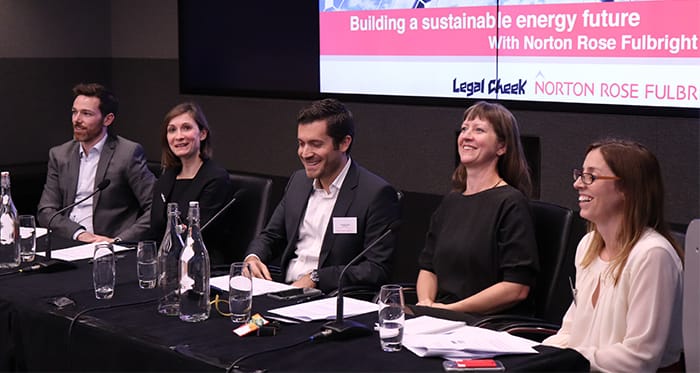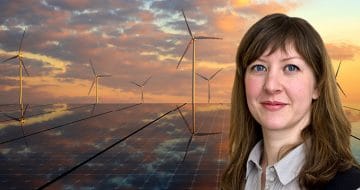Lawyers from Norton Rose Fulbright’s energy team advise

As one of the world’s leading firms for energy law, Norton Rose Fulbright is playing a key role in helping its household name global oil & gas clients adapt to a more sustainable and environmentally friendly world. The full service firm is also top ranked for renewables and alternative energy by both Chambers UK and the Legal 500, illustrating the depth of its expertise across the wider sector.
On the evening of Thursday 19 September a panel of lawyers from Norton Rose Fulbright’s energy team took questions from 130 students at Legal Cheek’s latest student event.
Lee Donovan, an associate specialising in climate change and clean energy; Suncica Miletic, a senior associate specialising in conventional and renewable energy projects; Santiago Ross, an associate specialising in energy and project finance; Rosa Mottershead, counsel specialising in energy and project finance; and Kathryn Emmett, senior knowledge lawyer specialising in energy project finance and regulation, considered the effect of government climate change policy, new regulation and recent case law, alongside the relationship between sustainability and economic growth.
They also shared insights into how they came to practice in this area and what they most enjoy about it. Here are the best bits from the discussion.
Policy and renewable energy
Responding to questions about the Paris Agreement and the ‘Green Deal’ proposed by newly elected European Commission President Ursula Von Der Leyen, the speakers noted the “massive change in rhetoric” in the discourse around renewable energy.
For climate change lawyer Lee Donovan, a key moment was the failure of the US’s withdrawal from the Paris Agreement to cause a domino effect. “Ultimately this showed that economics is now in play. Major countries have invested heavily in renewables and these projects have become important parts of their economic policy. This now goes beyond politics.”
Even so, there was acknowledgement that international agreements on emissions can be far from straightforward. “The Paris Agreement for now creates a moral obligation to act dependent on political will rather than binding law,” Suncica Miletic told the audience.
Rosa Mottershead added: “As exciting as Ursula Von Der Leyen’s proposed ‘Green Deal’ is, it will bring many challenges. Europe is a very diverse area and Eastern Europe is far more reliant on coal than other parts.”
But the aim of “making Europe a leader on renewables so that it is in a position to then influence other nations”, as Kathryn Emmett put it, is certainly a sensible one.
Santiago Ross highlighted Chile and Morocco as examples of two countries that had achieved impressive results through progressive renewables policy. Chilean government targets have helped the country triple its share of renewable energy over the last five years, across a broad range of areas including geothermal, wind and solar. Meanwhile, Morocco is on course to generate over half of its energy from solar power by 2030 and is already exporting energy to Europe. “These countries show how good policy can lead to huge success stories,” said Ross.
The role of the courts
The prevailing mode of bringing about change has mostly been carrot-style policies that encourage pro-green business through subsidies, but over recent years there are more examples of sticks being brandished — both through the courts and tax policy.
Attempts to argue through litigation that energy companies should be held to account for their contributions to climate change may struggle to establish causation in law, particularly if heard in the UK courts, but the speakers agreed that the very fact such cases are being heard shows how the dial has shifted.
Ultimately, tax policy may represent the most feasible longer term method of influencing behaviour, the speakers agreed. “Spreading the burden beyond energy companies to everyone who benefits from the power they produce, through taxes on, for example, air travel, may prove more effective than litigation,” predicted Ross.
Sustainability v economic growth
When asked how energy lawyers respond to “the conflict between sustainability and productivity and profitability”, the speakers suggested this was less of an issue than it’s sometimes thought to be.
“There doesn’t need to be a conflict between sustainability and profit anymore,” said Mottershead, as Emmett highlighted figures that showed UK GDP had risen over 70% as emissions had fallen by 43%.
Mottershead gave as an example of the new green economy a mortgage scheme being run by US home lender Fannie Mae that gave better loan terms to home owners whose houses met certain green credentials. This not only incentivises home owners to be green, but in meeting these green requirements, mortgagors often represent a lower investment risk. Ross and Miletic highlighted the fast-improving business models in sectors including electric car manufacturing that are expected to be leading economic performers in the next business cycle.
Technology is also set to play a major part in this new green economy. Indeed, noted Emmett, one possible use case for blockchain outside cryptocurrencies is for conducting transactions via automated smart contracts between microgrids (localised electricity sources made up of power from, for example, an individual house’s solar panels).
Why energy law?
The discussion closed with the speakers responding to a question about what attracted to them to this sector and what they enjoyed about it the most.
Donovan: “Having studied classics and then done a law conversion I started out wanting to be an IP lawyer. But during my training contract I realised I preferred helping build things rather than disputes — and found my way into the fascinating area of renewable energy.”
Miletic: “I began my career in construction law and have always enjoyed the technical side of things. Advising on energy projects has been a natural progression.”
What it takes to be an energy lawyer
Norton Rose Fulbright Graduates UK associate Santiago Ross reveals what it takes to be an energy lawyer
Posted by Legal Cheek on Monday, 14 October 2019
Ross: “It’s the political aspect of energy that drew me to it and is what I most enjoy. A $3 billion project can change the whole direction of a country. It’s a privilege to be part of that process.”
Mottershead: “I started my training contract wanting to be a litigator and then I did an energy seat. No one day is the same.”
Emmett: “Politics, economics, physics, law — the interplay between them all is fascinating.”
About Legal Cheek Careers posts.


